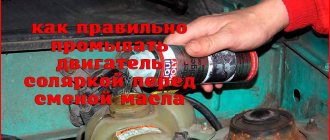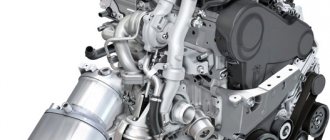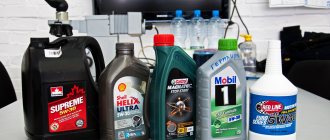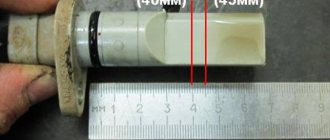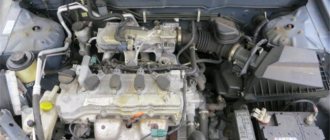In the modern world, regarding cars, there are two sides that constantly wage a certain struggle among themselves: gasoline and diesel TK. There have been so many disputes on this topic... However, they differ not only in the principle of their operation, but also in the lubricants (oils) used. It’s interesting, but on store shelves you can find not only diesel or gasoline lubricants, but also universal ones (which are suitable for both types of cars). Well, what happens if you pour diesel lubricant into a gasoline internal combustion engine? Now we will tell you in detail in this article.
Why can't you put diesel oil into a gasoline engine?
Features of diesel oil
Diesel fuel contains more sulfur than gasoline.
When diesel fuel burns, sulfur oxides are formed, which quickly saturate the oil during operation of the internal combustion engine. The high compression ratio required to ignite diesel fuel is the reason that a greater amount of gases enters the engine crankcase from the combustion chamber compared to a gasoline unit. The above gases also lead to active oxidation of the oil. The main requirements for diesel oil are:
- washing ability;
- high resistance to oxidation.
The base for diesel/gasoline oils is often the same; they differ only in different additive packages. Similar additives are contained in oil for both types of engines, and they also differ in composition depending on the units for cars, trucks, etc.
Diesel oil contains special binding and detergent additives. Therefore, the replacement interval for diesel oils is shorter compared to similar requirements in gasoline units. It turns out that diesel oil requires more frequent replacement due to the rapid accumulation of sulfur oxides and soot deposits.
In other words, diesel oil loses its lubricating ability more slowly, but the oxidation process is much faster. Therefore, diesel oil manufacturers add additives that most effectively neutralize the effects of oxidation products. Oils for diesel power units often have a high base number and show higher oxidation resistance.
What is the difference between oil for gasoline engines and oil for diesel engines?
Let's start with the fact that both types of engines operate on a similar principle, burning a fuel-air mixture in the cylinders. It is also well known that the main task of oil in any engine is to lubricate loaded friction pairs. Taking into account this information, at first glance it may seem that any oil will cope with its functions, regardless of which engine it is poured into. At the same time, until recently, lubricants for gasoline and diesel fuel units were more clearly differentiated by scope of application. The main reasons for this division can be considered:
- individual characteristics of each type of internal combustion engine (method of ignition of the mixture, maximum crankshaft speed, loads at the interfaces of parts, temperature, etc.);
- different types of fuel used (gasoline and diesel fuel), which differ in their composition and properties;
We also recommend reading the article about what will happen if you pour gasoline into a diesel engine. From this article you will learn about the consequences of gasoline getting into a diesel engine, as well as what a driver should do in a situation where a diesel car is accidentally filled with gasoline.
It turns out that, despite the similar principle of operation of both types of engines, diesel and gasoline oils are still different. Let's figure it out. Without going into too much detail about the process, in a diesel engine the oxidation of motor oil occurs much faster compared to its gasoline counterparts. This is due to the type of fuel used and the compression ratio of the diesel engine.
In a diesel engine, after combustion of the main part of the fuel charge, which consists of diesel fuel and air, a large number of residual elements remain. We're talking about soot. Also, a higher compression ratio (almost twice as much as in gasoline engines), necessary to heat the air in the diesel cylinders, which then allows the mixture to be ignited without spark plugs, simultaneously facilitates the penetration of more gases from the combustion chamber into the diesel engine crankcase. These gases greatly accelerate the process of oil oxidation.
Taking into account such features, manufacturers add special additive packages to diesel oil. The need for special additives is also dictated by the fact that diesel fuel contains more sulfur compounds compared to gasoline. As a result, after combustion of the fuel charge, a lot of sulfur oxides appear in the diesel engine. These products have an extremely aggressive effect on the internal combustion engine and lubricant. All this means that additives are separately added to diesel engine oils to combat oxidation. In other words, the alkaline number of the oil and ash content for a diesel engine will be noticeably higher in this indicator compared to a lubricant designed for use in a gasoline unit.
In parallel, diesel oil contains active components that slow down its aging and allow the lubricant to be more stable against the background of active oxidative processes. It should also be noted that a diesel engine requires more air to operate properly than a gasoline engine. As a result, there is an increased tendency to carbon formation and coking. To counteract this, the oil must have improved cleaning properties, while its service life should not be significantly reduced.
As for oils for gasoline engines, the fuel charge burns in such engines without much soot emission. Also, gasoline initially has a lower sulfur content compared to diesel fuel. It turns out that there is no need to include active detergent components or increase the alkaline number in the additive package for gasoline oil, since the lubricant in gasoline internal combustion engines is less subject to oxidation.
Another feature can be considered that the operating average and maximum speeds for gasoline and diesel engines are also different. For this reason, gasoline oil contains separate additives that provide improved protection of loaded parts at high speeds. For motor oil in a gasoline engine, it is extremely important to ensure stability of dynamic and kinematic viscosity, taking into account shear deformation. In the case of a diesel engine, which simply does not spin up as much, this parameter is not so important.
What is the difference between diesel oil and gasoline
The main problem of a diesel engine is increased soot contamination and oxidation, and accordingly there is a greater need for alkaline, binding and detergent additives. While for a gasoline engine - stability of the oil film and resistance to burnout.
Diesel oil additives have greater cleaning properties. They have a higher alkaline level
, which is necessary for splitting and removing solid deposits.
However, these oils are more susceptible to carbon formation
(increased ash content) when the engine operates at high speeds!
ICE on diesel
Such an engine works slightly differently than a gasoline engine. It has the following features:
- A diesel engine is subject to a higher thermal load. This is due to the high power of the unit.
- High compression during the operation of a diesel engine affects the oxidation process. It happens faster than in a gasoline engine. The diesel in the cylinder block does not burn completely. This is a significant drawback. A lot of carbon and soot deposits form in the cylinders.
- Due to the strong compression, a large amount of exhaust enters the crankcase.
- Diesel is characterized by a high content of sulfur elements. When they burn, a lot of sulfur oxides appear. They negatively affect the functioning of the internal combustion engine and aggressively affect its parts.
Manufacturers of lubricants for diesel engines add various additives to them to ensure the proper functioning of the internal combustion engine. Additives help neutralize oxidizing elements.
Diesel engine diagram
So is it possible to pour diesel oil into gasoline engines or is it still not possible? The answer is yes, you can pour it. There are simply no contraindications that make it impossible to use diesel oil in a gasoline engine. When motor oil enters a gasoline engine, it enters the combustion chamber through the pistons. At the same time, lubricant passes through the oil caps. Different formations appear in them. This can lead to incandescent burning and detonation. If you decide to pour diesel oil into a gasoline power unit, you need to use fuel with a high octane index.
Why can't you do this?
What is the problem? Roughly speaking, in absolutely everything! Diesel power units are famous for their higher compression levels (which are sometimes twice as high as their gasoline “brothers”). Based on this, its “insides” are much stronger (that is, a gasoline internal combustion engine would very quickly overheat under such loads). Such motors are not revving. And combustion in them occurs not from the lighting of candles, but from the level of pressure.
Gasoline engines cannot boast such a high level of compression. And the temperature in their combustion chambers is much lower. And those cars that are equipped with turbines are quite difficult to warm up to high temperatures, especially in winter. And when driving along the highway - towards the wind - this mission is not at all feasible. In this case, unlike the first, there are high speeds (as for diesel engines, they are simply prohibitive). In this case, there are glow plugs (it is because of their malfunction that it is sometimes impossible to “start” in the winter, so, gentlemen, keep an eye on them).
Drawing conclusions from the above information, it should be noted that oils for both types of cars differ significantly from each other. One is designed to withstand high loads and temperatures, and the second is designed to withstand high speeds. There can be nothing in common between them.
Consequences of using diesel oil in a gasoline engine
Diesel oil for gasoline engines
Therefore, taking into account the properties of diesel oil and engine operating conditions, there may be two developments in the use of such a lubricant in a gasoline engine.
1st case
Using oil in a gasoline engine of a light truck, such as a GAZelle, which operates at low speeds and the oil change schedule is not always followed, can help remove carbon deposits
. Because the best composition for pre-washing an engine is one that contains a lot of calcium additives and a high alkalinity index. On the Internet you will find more than one story about how hydraulics stop knocking, the engine becomes quieter, and it cleans better.
That is, diesel oil is often used as a long-term flush. After all, since the cleaning properties of such oil are 2 times higher, provided that the engine does not spin above 4000 rpm, deposits
, which formed earlier, become softer.
And then when washing the inside of the engine during disassembly, it is easier to remove
.
However, it is worth considering that heavily contaminated engines can cause harm, since the dirt will flow in large pieces through the oil channels and, if they are thin, can clog them. This may cause the engine to simply seize.
!
2nd case
As I said above, diesel oil does not like high speeds! Accordingly, the use of such oil in a modern engine, where a low ash content is required, and the oil is susceptible to high temperatures, leads to the fact that the inside of the engine, on the contrary, will be covered with resinous deposits, and the pistons and all oil channels will quickly become coked
!
By the way, to make this process more understandable, look at the article: “Why do the piston rings of modern engines lie down quickly.”
Consequently, clogged oil channels will lead to oil starvation and scuffing.
!
If you share the same opinion - PRESS THUMBS UP
and
SHARE
on social networks so that your friends also know about the consequences of using diesel oil in a gasoline engine!
Reviews from motorists
Some attention can be paid to reviews in which drivers share their impressions of pouring diesel oil into a gasoline engine. I will give a few comments from the Internet.
Andrey, 35 years old
I went to visit relatives, but on the way it turned out that the oil in the engine was at a minimum. At the nearest gas station, as luck would have it, there was only diesel lubricant. There were no other options at all, and it was impossible to drive without lubrication. As a result, I filled up with diesel. Well, what can I say, the car’s engine was saved, but I had to tinker with the flushing later. In short, if you are careful and careful, you can fill it once.
Igor Petrovich, 57 years old
I filled the VAZ with diesel lubricant. I got the markings wrong and wasn't wearing glasses. I filled it up and drove off, but I feel like the car doesn’t pull, it doesn’t drive well. I started to find out what the reason was and it turned out to be the oil. This composition did not have time to harm the engine, but the auto repair shop said that if I stepped on the gas, the engine would have to be repaired.
Konstantin, 44 years old
I entrusted the foreign car to my son, and on the advice of the mechanic, he filled the Hyundai with diesel oil. Then I went for a ride, of course I raced. Well, in the end, a major overhaul of the engine, expenses, problems with the exhaust system. I saw the engine after such operation - a terrible thing. The mechanic also explained to me that it is strictly forbidden to pour thick, aggressive oil into Asian cars. The lubricant clogs all the channels and does not work. My son was punished, the car was repaired, and I don’t look at diesel anymore.
Universal oils for diesel and gasoline engines: is it worth using them?
There are universal oils that can be used in both gasoline and diesel engines. These products fully comply with API and ACEA standards. They are marked with the same categories S and C, but with a small caveat.
For example, the inscription SJ/CF on the canister label indicates that the oil is universal, but its use is priority in gasoline units. The CF/SJ marking indicates that the product is preferred for use in diesel engines.
As practice shows, the use of universal oil with a reduced base number (TBN) in turbodiesels is not always justified. It all depends on the quality of the fuel and the timing of the service replacement.
Differences between oils for cars and trucks
As for passenger vehicles, they are more resourceful. It is for this reason that the lubricant must first and foremost withstand their speed. But unlike freight transport, they are more often subject to replacement. Truck lubricants are designed to last longer. In addition, when creating them, manufacturers focus on compression (rather than revolutions, as is the case with passenger vehicles). More alkali and additives are used to make truck lubricants. Can passenger oils be used for trucks? Forbidden! And here are a few reasons why not:
- the strength of fighting soot decreases;
- The service life of the lubricant is significantly reduced;
- more frequent replacements;
- low level of alkalinity.
Despite the fact that lubricants for trucks are “sort of better,” they cannot be used for passenger vehicles. Because you risk getting a lot of carbon deposits on the pistons and cylinders.
Energy-saving motor oils
The main purpose of the so-called energy-saving motor oils is to save fuel and thereby increase the environmental friendliness of the engine. Reduced fuel consumption is achieved by minimizing friction losses. This property of motor oil is determined by the HT/HS indicator - it indicates the viscosity of the oil at high temperature and high shear rate.
At a temperature of about +150 °C, standard oil retains sufficient viscosity, which allows it to fully protect the loaded parts of the power unit.
Reducing viscosity under similar conditions allows engine components to interact with less loss, resulting in fuel savings. However, as the temperature of the power unit increases, the thickness of the oil film decreases. The engine “spuns” easier, but the protection of its parts from wear weakens.
Energy-saving oils should only be used if they are recommended by the vehicle manufacturer for specific engines. The motor must be designed to provide for the use of such a liquid.
In such engines, the oil channels are narrow; the lubrication system requires less viscosity to create the required oil pressure in the diesel engine and effectively supply it to the loaded rubbing pairs.
You should definitely not use energy-saving oil in old gasoline and diesel engines.
Oil oxidation problem
Thus, a diesel fuel mixture consisting of air and diesel fuel, after combustion, leaves a lot of residual elements - soot. Also, in a diesel engine, the compression ratio of the fuel mixture is almost twice as high as in a gasoline engine. This is necessary in order to ignite the fuel mixture without spark plugs. In addition, increased compression heats the air in the cylinders and allows more gases from the combustion chamber to penetrate into the crankcase. These gases greatly accelerate the oxidation process of the oil.
Taking into account this feature of the diesel engine, manufacturers add special additives to oils that are aimed at combating oxidation. It is also worth considering that diesel fuel contains sulfur compounds (gasoline also contains them, but there are much fewer of them), which form sulfur oxides after combustion. So you can’t do without an additional package of additives in the oil. Combustion products have an aggressive effect on the engine and oil, so lubricants must be appropriate.
Diesel oil also contains special components that are aimed at slowing down the aging process. They make the lubricant more resistant to oxidative processes. In addition, the combustion of diesel fuel requires more air, which is fraught with the formation of coke and various soots. This means that the oil must have good cleaning properties without compromising its service life. This is the peculiarity of oils for diesel engines.
Classification of motor oils for diesel engines with turbine
Recommended classifications, parameters, tolerances and requirements for engine oil for a specific make and model of car are usually specified by the vehicle manufacturer in the owner's manual.
When selecting an oil, first of all, you need to pay attention to its viscosity (SAE) and classification. The latter indicates the quality of the product in accordance with certain standards:
- API - American
- ACEA – European model
- ILSAC - Asian
Most often, the API classification is indicated on diesel engine oil, and a little less frequently ACEA and ILSAC. Sometimes all the designations are present at once.
The letter designations on the label indicate that the lubricant belongs to one class or another - for example, SF/CD. S (Service) indicates that the petroleum product is suitable for gasoline engines, C (Commercial) - for diesel engines.
The separating fraction indicates the versatility of the oil, i.e. Possibility of use in different types of motors.
The letters that come second show the level of performance properties of the oil: the further they are from the beginning of the Latin alphabet, the better the product.
Not all API fluids are suitable for turbocharged diesel engines, but only some of them.
These are oils with the designations:
- CE - for turbodiesels produced after 1983
- CF4 - for four-stroke engines manufactured after 1990
- CC – for units with moderate turbocharging operating in difficult conditions
- CD – for high-pressure diesel engines operating under severe conditions on fuel with a high sulfur content.
Oils of categories CA and CB are now discontinued; CD11 and CF12 can be used for two-stroke engines.
The following designations should be understood in the ACEA classification:
- B2-96 – Standard type oils for turbocharged diesel engines
- B3-96 – Extra type lubricating fluid for diesel engines with and without turbocharging
- E1-96 – Standard type engine oil for high-pressure trucks that operate under severe conditions
- E2-96 – differs from the previous type in improved properties
- E3-96 – Extra type lubricant for high-pressure trucks
All these oils help ensure durable and reliable operation of both the engine and the turbocharger.
Which brand of diesel oil is better to choose?
The first thing to do when selecting a product for purchase is getting to know the manufacturer’s brand, its reputation, assortment and quality guarantees. This means that before moving on to analyzing the best diesel oils, it is advisable to learn more about which brands are recognized as leading in 2021. Experts noted the following:
- Gazpromneft is a vertically integrated oil company from Russia, registered in 1995. It is primarily engaged in the search and production of gas and oil, product processing, production and sales. In terms of the volume of such work, it is among the top three leaders in the country.
- Castrol is a British manufacturer of lubricants such as gear oils, motor oils and other specialty products. Founded in 1899, it belongs to the BP group of companies. Representative offices are located in more than 130 countries around the world.
- ELF is a subsidiary of Total, founded in 2014. Total is known in many countries for its high-quality technical fluids. The Elf brand presented a new look at oils in two groups: Evolution for moderate driving and Sport for intense loads.
- ZIC is a brand owned by the South Korean company SK Lubricants, which produces and supplies lubricants to more than 40 countries around the world. In 2015, the range was updated with new unique recipes.
- Motul is a French company founded in 1853. It is exclusively engaged in the production of engine lubricants based on fish oil for industry and various vehicles.
- Shell is a British-Dutch oil and gas company operating since 1907. For two years now it has been considered the largest public oil and gas company in the world, included in the top 11 according to the Forbes Global 2000 rating and the top 5 according to the Fortune Global 500.
- Champion is a trademark owned by the Belgian company Wolf Oil Corporation, which develops all components for lubricants and car care products. 70% of products are supplied to more than 55 countries.
- Liqui Moly is a German company founded in 1957. Engaged in the production of oils, additives, lubricants, and automotive chemicals for vehicles. Over 6,000 assortment items are produced annually.
- Idemitsu Kosan is a large oil company from Japan, founded in 1911. The world's second largest corporation, right after the global giant Nippon Oil. It became famous for its high-quality lubricants and oils.
- Oilright is one of the oldest trademarks of the Delfin Group. The literal translation of the name is “the right oil,” as the manufacturer assures, these are high-quality products with fair price tags. The buyer is presented with a full range of additives and lubricants.
- Mobil is an American company founded in 1911. It is one of the most influential oil companies in the world, extracting, refining and transporting fuel. Applies innovation and technological advancements to meet energy industry market needs.
- Bardahl is a global manufacturer of lubricants in the automotive world, founded in 1939 in Norway. The representative offices are located in Italy, Belgium, France and other countries.
- Eneos is the largest manufacturer of motor lubricants in Japan. The main share of production is located in South Korea. The assortment includes over 20 items with a mineral, semi-synthetic, and synthetic base.
Engine oil for a diesel engine with a turbine - choice of brand
The oil liquid that is poured into a diesel unit is made from mineral products supplemented with additives and additives. Depending on their presence, the lubricant can be mineral, synthetic or semi-synthetic.
- Mineral lubricant appears as a result of distillation of petroleum products (fuel oil) or can be obtained from agricultural plants. Due to its ease of manufacture, mineral lubricant has low cost and good performance.
- Synthetic lubricant is an artificially created product and is obtained through the synthesis of microelements. It is almost independent of external influences, is stable during operation of the power mechanism and has good performance indicators.
- Semi-synthetic oil liquid is obtained by mixing mineral water and synthetics. The ratio of lubricants can be from 30% to 50% synthetic component and from 50% to 70% mineral.
Depending on the structure, the oil solution can be winter, summer or all-season. You can distinguish oils by their markings. Lubricants that are used in winter are designated by alphanumeric marks, summer ones by numbers, and all-season lubricants by double markings.
Car service centers and ordinary car enthusiasts recommend oil for various turbocharged diesel engines of the following brands:
- Liqui Moly. Synthetic lubricant made from polyalphaolefins. Can be used at any time of the year on diesel engines that have a turbocharger or intercooler operating under various loads.
- Mobile Delvac. Universal all-season lubricant for all types of power mechanisms. It has good performance indicators, allowing for the lubrication of components and assemblies and their subsequent cleaning.
- Castrol Edge Turbo Diesel. Synthetic lubricant for diesel units, made using Titanium technology. Creates lubricant strength and stability during operation.
- Lukoil luxury turbo. Domestic semi-synthetic lubricating fluid. Provides easy motor starting and high-quality operation of the components and mechanisms of the power plant. The oil is used for small turbodiesel engines installed on buses, small trucks and cars.
- Motul. Synthetic lubricant for all types of diesel units. The main characteristic of this lubricant is its ability to maintain its performance at high operating temperatures.
Diesel oil rating
The market for automobile lubricants is full of brands, names, and varieties, so not all buyers know which diesel oil is best to pour into the engine. To avoid mistakes, the following evaluation criteria are adhered to:
- Viscosity (SAE) – summer, winter, all seasons;
- Performance characteristics (API) – S for petrol, C diesel, CF turbocharged system;
- Specific requirements (ACEA) – A for gasoline, B diesel, E high-power truck engines, C universal type;
- Technological base – synthetics, semi-synthetics, mineral base;
- Replacement frequency – vehicle mileage before the next refueling;
- Volume - how many liters one package contains.
Real customer reviews, experience of specialists, and test results in practice helped us evaluate each product. The best recommendations were received by new products created taking into account technological innovations. The ratio of quality characteristics and price tags was taken into account.
Mobil Delvac MX Extra 10W-40 is the market leader
This is the best semi-synthetic diesel oil, recognized in Europe and Russia. Provides excellent lubrication of the power unit undergoing increased loads.
It is characterized by cleanliness of work. The manufacturer recommends it for American, Japanese and European cars.
Pros:
- has the correct oxidative stability due to the mixture of base and additives;
- pronounced anti-wear property;
- reduces deposit formation;
- increases engine service life and reduces sludge formation;
- optimal viscosity-temperature properties for use all year round;
- pumps well at low temperatures;
- suitable for modern high power diesel engines with minimal emissions (for high pressure fuel injection);
- improved protection of parts from corrosion;
- ensures stable pressure in the oil filter;
- Recommended for SUVs, heavy-duty vehicles and agricultural machinery.
Minuses:
- high cost from 500 rubles per 1 liter;
- there are fakes.
Shell Helix HX8 5w30 - at a premium level
This is the best synthetic diesel oil from an American manufacturer, with the largest number of positive reviews. Available in a dark blue plastic container with a capacity of 1 or 4 liters. If it is poured into the crankcase, the engine can be started even in frosty conditions of -30 degrees.
Pros:
- recommended specifically for Mercedes and Volkswagen cars;
- complies with American and European standards API, ACEA;
- all-season lubricant;
- does not thicken in winter in cars left outside;
- easy engine starting in any weather;
- the motor operates without any extraneous noise;
- many useful additives;
- does not leave soot or deposits inside - tested by many mechanics during disassembly.
Minuses:
- there are fakes;
- high cost from 300 rubles per 1 liter;
- it is highly fluid, so although it lubricates well, it comes out from under the gaskets and connectors - you have to top it up to the level so that the light does not burn;
- After maintenance and 5000 km, some owners experience a clicking sound from the hydraulic compensators on a cold engine - after warming up, the sound disappears.
LUKOIL Standard SF/CC 10W-40 4 l
pros
- Low price
- Versatility
- Significantly reduces oil consumption in older engines
Minuses
- Minimum set of additives
- Not recommended for new engines
A product in the budget range for internal combustion engines with high wear and which experience increased oil consumption. Thanks to this lubricant, the old vehicle will last for many more years without major repairs. Has good antioxidant and detergent properties.
Mobil Super 3000 X1 Diesel 5W-40
Second place in our ranking is taken by the world famous brand Mobil for diesel engines. The product has a completely synthetic base, which, together with a package of special chemical additives, forms a durable, heat-resistant protective layer on the structural parts. This layer protects the system not only from overheating and rapid wear, but also helps to neutralize chemical reactions that occur during vehicle operation.
The oil product belongs to the “all-season” category: both during extreme cold and during periods of excessive heat, a stable pressure of engine oil is created, which is evenly distributed in a diesel engine in a matter of seconds. The lubricant does not crystallize, does not lose viscosity, it reliably performs its functions, even if driving conditions require increased load on the engine compartment. For aggressive, urban or moderate driving styles, the car is under the reliable protection of Mobil Super 3000 X1 Diesel.
Approvals and specifications: ACEA A3/B3, A3/B4, MV 229.3, VW 502.00/505.00, Renault RN 0710/0700, API CF, Opel GM-LL-D-025.
Castrol Magnatec Diesel 5W-40 DPF
This synthetic lubricant is created using Intelligent molecules technology. Smart molecules in the composition adhere to the metal surface, thereby forming a protective film on the parts. This prevents the lubricant from draining even during startup. The manufacturer has improved the dispersing properties, thanks to which the engine is cleared of soot without thickening the oil. Castrol Magnatec Diesel 5W-40 DPF is intended for engines with intercooler, turbocharging, and injection. The prefix dpf indicates admissibility to engines with particulate filters, W - winter, number 5 - use up to -35 degrees, number 40 - use up to +40 degrees.
Advantages
- Unique protection technology;
- Dispersing properties;
- Extended range of permissible temperatures;
- Increased response speed;
- Increased efficiency and engine power.
Flaws
- Harmful deposits after working at high temperatures;
- Price.
The lubricant protects the vehicle at the moment of starting, even in case of overheating. In practice, it was found that the texture actually does not flow down, revealing the potential of the motor, extending its service life. The disadvantages for users include deposits after high heating, as well as a rather large amount on the price tag.
SHELL Helix Ultra ECT C2/C3 0W-30 4 l
pros
- Easy cold start
- Engine runs smoothly
- No wastage costs
Minuses
- Rarely found in stores
- A bit expensive
Shell has created a lubricant that is compatible with a variety of emission control systems. Thanks to this, the particulate filters do not become clogged quickly and optimal engine performance is maintained. The oil protects metal elements well from corrosion.
Castrol Edge Turbo Diesel 0W-30 4 l
pros
- No need to top up
- The engine does not make noise
- Good lubricating properties
- Convenient packaging
Minuses
- High price
Castrol Edge Turbo Diesel 0W-30 is considered the best oil for modern turbocharged diesel engines. Titanium compounds contained in additives give the oil film strength, which increases the service life of the power plant. The lubricant prevents the formation of soot deposits in a turbodiesel engine.
Liqui Moly Diesel Synthoil 5W-40
Liqui Moly Diesel Synthoil 5W-40
The best motor oil is difficult to find, because each has unique capabilities and purposes. When talking about truly effective formulations for diesel engines, one cannot fail to mention the German oil Liqui Moly Diesel Synthoil 5W-40.
It is created on the basis of polyalphaolefins in combination with a special package of additives, which not only cleans rubbing surfaces and the working space from polluting particles, but also neutralizes the reactions that occur after refueling an internal combustion engine with low-quality diesel fuel.
The high thermal stability of motor oil allows it to be actively used in turbocharged units. The rapid distribution of the mixture over the system's mechanisms ensures easy starting of the vehicle in any weather conditions. Unlike analogues, Liqui Moly for diesel does not freeze in extreme cold and does not crystallize. This allows the use of petroleum products even in the northernmost regions of our country. Due to this property, savings in oil consumption are achieved.
Due to the fact that the lubricant provides an oil layer of optimal thickness, which does not leak through the gaps of the structure and does not interfere with the free movement of parts, the engine achieves economical consumption of the fuel mixture.
Approvals and specifications: API CF, ACEA B4, BMW LL-98, MV 229.3, VW 505.00.
Idemitsu Zepro EURO SPEC 5W-40
Idemitsu Zepro EURO SPEC 5W-40
An excellent option for diesel engines of cars, minibuses and SUVs. The oil has all the properties necessary for the successful functioning of the system: it perfectly lubricates rubbing parts, removes heat from the most loaded components of the internal combustion engine, and also contributes to the economical consumption of the fuel mixture.
Japanese technology makes it possible to create high-strength technical lubricants that can withstand high thermal loads, so Idemitsu Zepro EURO SPEC 5W-40 can be poured into both simple aspirated and turbocharged units. The oil does not undergo structural changes even during climatic changes: the operating temperature of the oil has a wide range, which ensures a stable supply of lubricant to all structural components in both extremely hot and cold weather.
As for cleaning capabilities, the petroleum product is not inferior to its competitors: thanks to the addition of highly effective additives to the Idemitsu composition, order and cleanliness always reign under the hood of the car. The fully synthetic composition of the motor oil carefully takes care of the condition of new cars and vehicles that have traveled more than one hundred thousand kilometers.
Approvals and specifications: API SN, SM, SL, CF, ACEA A3/B3-10; A3/B4-10, Porsche A40, BMW LL-01, MV 229.3, 229.5, VW 502.00, 505.00.
Lukoil Lux Turbo Diesel API CF 10W-40 - good combination of price and quality
This is the best semi-synthetic diesel oil, liked by most users in terms of quality and cost. For 1 liter you need to pay about 200 rubles. Available in convenient bottles with a stop so that it does not slip out while pouring oil into the engine.
Pros:
- suitable for all types of equipment with diesel engines;
- will work well in both old diesel engines and new turbocharged models;
- if domestic diesel fuel contains a lot of sulfur, then it will not harm the oil - the latter has a high resistance to decomposition;
- easy start in winter;
- antioxidant properties;
- supports the operation of the emission reduction system;
- promotes low noise from the motor;
- retains its properties at the end of its service life.
Minuses:
- after 8000 km it may get dark, but don’t be afraid.
TOTAL QUARTZ 9000 5W-40
For atmospheric and forced internal combustion engines, many consider this lubricant to be quite effective. Even in summer, lubrication helps the engine operate normally. TOTAL QUARTZ 9000 5W-40 is produced under French license. This brand is used in more than 80 countries, noting its high quality specifically for energy-rich engines.
Sources
- https://dlobal.ru/chem-dizelnoe-maslo-otlichaetsya-ot-benzinovogo/
- https://mirsmazok.ru/masla/maslo-dlya-dizelnykh-dvigateley-s-turbonadduvom/
- https://vyborexperta.ru/avtomoto/luchshie-dizelnye-masla/
- https://vmasla.ru/interesnoe/dizelnoe-maslo
- https://koleso.temaretik.com/1498293563416381812/kakoe-maslo-zalivat-v-dizelnyj-dvigatel-sekrety-i-osobennosti/
- https://4x4privod.ru/luchshie-masla-dlya-dizelnyh-dvigateley-2021-goda-reyting-motornyh-masel-s-turbonadduvom-5w-30-5w-40-10w-40-sintetika/
- https://ProAvtomaslo.ru/dvigatel/kakoe-maslo-zalivat-v-dizelnyj-dvigatel



